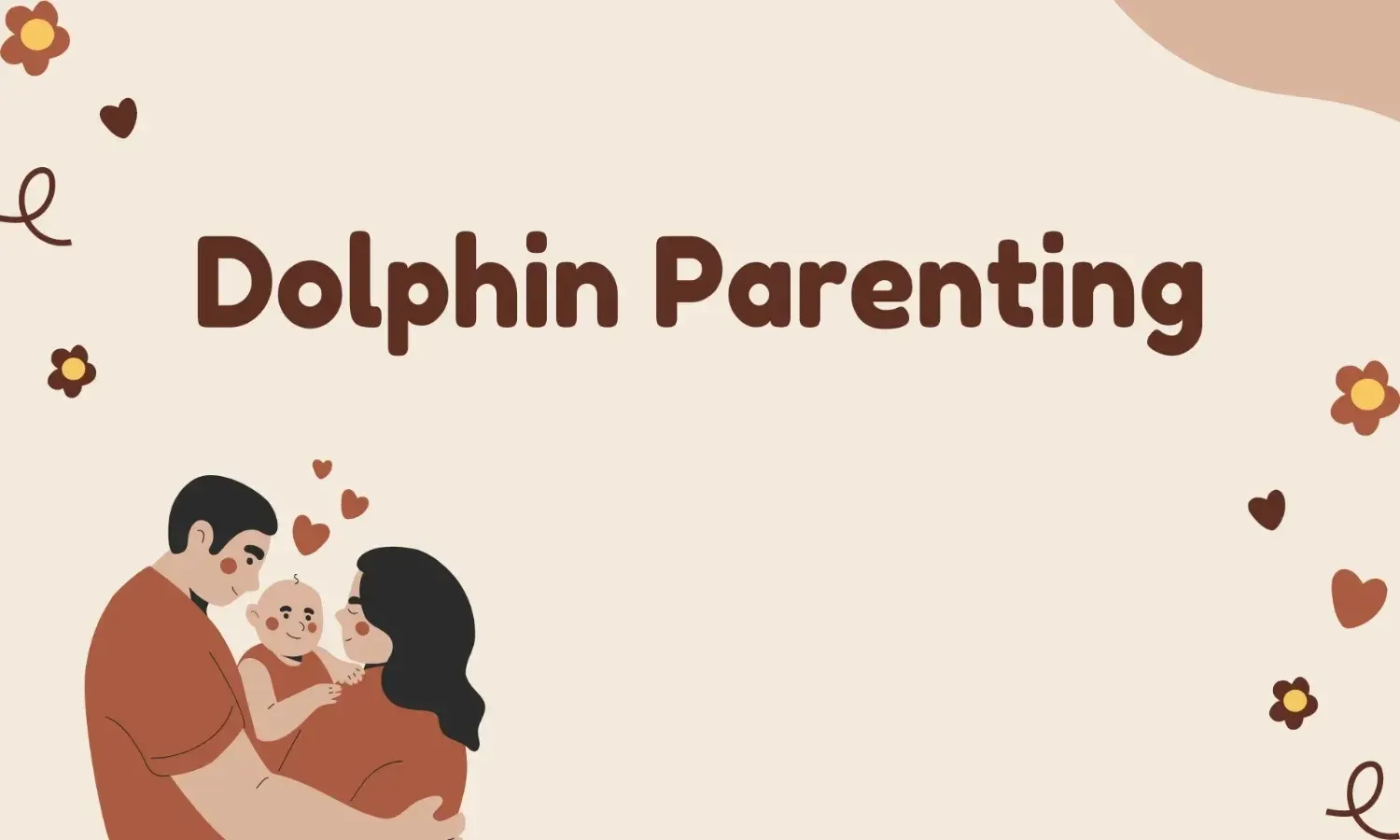The Dolphin Parenting Style as the name suggests is one of the recently introduced approaches which focuses on how best children can be brought up. It is termed after how dolphins, whose main job is nurturing their young, strike a balance between offering playfulness and imposing discipline. Instead of habitual tiger or jellyfish parenting approaches, it engages in ‘dolphin parenting’.
Children are raised under some form of gentle parental control without undue restrictions that allows the child the freedom to develop as an individual more than being what the parent or society would want. This article will examine the tact that dolphin parenting deploys and understand why this approach should be adopted in rearing children.
What Are the Key Characteristics Of Dolphin Parenting?
What is Dolphin Parenting?
Dolphin parenting is a balanced approach that ensures children have guidance and freedom. In this case, it becomes necessary to be clear on issues but not inflexible. This might be different from extreme and rigid approaches like helicopter or authoritarian parenting. Role model and mentor are two key positions that parents take, equipping children with required practices while encouraging them to practice self-control.
So, dolphin parenting is about raising children to incorporate emotionally, creatively, and in all aspects to be able to handle whatever life throws at them.
Core Principles of Dolphin Parenting
The key elements that comprise the dolphin parenting paradigm are striking a balance, promoting connection, and being flexible. These principles highlight the significance of a healthy parent-child relationship that is founded on trust and appreciation. Dolphin parents instill the interest of the children without the children wandering off. They practice active listening, positive relations toward children, and supportive parenting instead of authoritative parenting.
This mild domination and the delegation of freedom enable children to be secure and self-assured in the acquisition of adequate problem-solving and emotional stability through the constructive experiences in their environment.
Benefits of Dolphin Parenting for Children
Promotes Emotional Intelligence
The most salient feature of the dolphin parenting approach is its effect on emotional intelligence. In providing such a nurturing surrounding where children can articulate their feelings, dolphin fathers allow their kids to gain empathy, and self-consciousness, and become socially adept. As a result of being brought up in this manner, children tend to have better control of themselves and even understand other peoples’ emotions.
These emotional skills are very important in seeking and maintaining relationships and overcoming various difficulties in life. Dolphin parenting nurtures children’s emotional development by encouraging talking about feelings and understanding emotions up and down.

Develops Self-Reliance and Self-Respect
In Dolphin parenting, children are guided to make choices within specific limits thus cultivating independence. This technique helps children to pursue their interests, fail, and learn in a risk-free context. Such parents allow children to learn life lessons by not following them everywhere nor controlling everything they do.
A child who is brought up in this manner is more likely to be independent and face challenges without reliance on others. The principle of balance ensures that parents help children while promoting their growth and self-dependence.
Promotes Cognitive Growth
The dolphin parenting style nurtures cognitive growth through the invitation of imagination and analysis. Dolphin parents, on the other hand, encourage exploration and in particular, the child’s predisposed center of inquiry. See Offers creative, problem-solving and decision-making, playful reading of books, and other activities when outside the house.
This practice enables children to go through different development stages at their rates and also receive help from their parents when they require it. A prerequisite of school and other life success skills is the appropriate development of cognition which dolphin parenting provides through a good mix of controlled and unstructured play time.
What Sets Dolphin Parenting Apart from Other Parenting Styles?
Dolphin Parenting vs. Tiger Parenting
In this haphazard type of parenting, Tiger Parenting where the parents create expectations that are too high is more rigid, it demands more discipline which is sometimes at the expense of the child’s emotions. On the other hand, dolphin parenting is concerned with the middle ground where boundaries are not overstepped.
While tiger parents may aim for academic achievements for their children and imagine how many awards and medals they could earn, dolphin parents have a broader perspective than only good grades encouraging emotional health and creativity as well as life skills development in addition to academic success. Dolphin parenting creates a more positive, less anxiety-filled atmosphere in which children are raised.
Dolphin Parenting vs. Helicopter Parenting
Helicopter Parenting is when the parents net hop and operate around the child every minute being involved in all plans and activities of the child. But in the case of dolphin parents, such practices are unheard of as these parents allow their children to make their own decisions and make mistakes too.
While Helicopter parenting constitutes walls that inhibit independence, dolphin parenting establishes frameworks with self-governance and problem-solving. Both parenting styles utilize nurturing and management but there is a difference in the amount of allowance for the child’s growth, errors and ownership of accountability whereas with Dolphin parenting the child can feel the extent of support though without over-reliance.
Sparse Technical Tips on Dolphin Parenting
Be Firm in Your Instructions
A fundamental distinguishing factor of a dolphin parent is that they draw lines and set rules for kids and themselves in parenting. Such boundaries are important because they offer a level of safety and order. Even so, they ought to be suitable to foster growth and encourage new experiences.
Boundaries for parents assist children in learning how far they can go and what parents expect of them while still enjoying the majority of the autonomy. For instance, limitations set on the amount of time spent on studies, playing games, and sleeping can instill responsibility but still offer room to negotiate and compromise.
Maintain Communication Ensuring Children Regularly Speak Up
There are lots of traits associated with dolphin parenting, however, one of the most essential traits is communication, and that is communication in all directions. It entails making attempts to not just talk with children, but also hear and understand their words or emotions as well. This invites kids to be surrounded by safety because their needs are heard and validated.
Regular updates about their narratives, hobbies, and stories possible emotions could enhance parents’ relationships with the kids. According to a study and being a child, I felt that dolphin parents were trustworthy because they made it easy for children to talk about anything without the risk of being condemned. This helps children to have confidence and develop their relationship with their parents.

Finding the middle ground of Structure and Freedom
Maintaining a good interplay of constraints with liberty defines dolphin parenting. It is important to create an environment with structure and certain boundaries. However, it’s equally crucial to let kids be kids by allowing them to follow their whims as well as their judgment.
Dolphin parents encourage their kids to take risks and learn from their errors, which in turn nurtures the skills of problem-solving and even resilience. From picking inclusive sports to managing their circle of friends, they should be given chances to make their own decisions to develop independently.
Constant Struggles Most Parents Face While Being Dolphin Parents
Equilibrium in Disciplining the Child
Dolphin parenting has its challenges and one of them in particular is balanced discipline. It is not always easy to find the right balance between the demands made and the freedoms given to the child. Excessive authority leads to defiance while little authority breeds no depth or limits in the thoughts of the child.
Dolphin parents may also be encouraged to give praise and acknowledge appropriate behavior rather than emphasizing fussing negative behavior. Discipline should be viewed as a form of education that teaches children about the nature of consequences associated with one’s behavior rather than a system of rules that is to be followed.
Coping with Peer Tensions
Peer pressure usually becomes a problem when children reach some specific age. This problem can be exacerbated by kids who are brought up in completely different parenting styles as compared to theirs. It can be quite hard for dolphin parents to strike a balance when their child comes home and starts comparing the mildly prone or domineering parents to theirs.
The best thing is to keep the lines of communication open and to have established trust. Parents encouraging their children to share their thoughts and feelings about peer pressure helps to appropriately navigate the said problem as both the kids and the parents are able to retain their values.
The Effect of Dolphin Parenting into the Future
Raising Strong, Healthy Individuals
Dolphin parenting is effective since the children usually grow to be healthy and adjusted to different settings. Parents need to learn how to achieve the balance of offering freedom and providing guidelines all the time. It is said that children who have been brought up using this method tend to be more flexible in thinking and emotionally mature when faced with stress and challenges.
This is likely to explain their high levels of confidence, reasoning, and resilience. The benefits of dolphin parenting such as increased self-control, compassion, and creativity are therefore leveraged in the future by such children.

Promoting Emotional Well-Being Through Education
The parenting philosophy of dolphins makes it possible to achieve emotional health throughout life. By finding out the best way to communicate and teaching them about emotions, dolphin parents provide children with the means to repair their social interactions.
These children are likely to forge social attachments, emotional regulation, and life satisfaction. It also allows children to acquire a sense of mastery that will protect their mental well-being and life satisfaction in adulthood.
Conclusion
Children should be raised the dolphin parenting style is overall a loving and soft approach. It adequately embraces boundaries and allows self-regulation of the child’s feelings and urges as well thus developing the workmanship. Communicating effectively with parents, obeying the rules and boundaries, and having us in a safe environment enables the children to develop ethical and morally stable lives.
This style of parenting ensures and prepares the child with all the good virtues that a child requires to succeed in the course of his or her life. There is therefore hope for parents who want moderation in the way their children are raised and thus evolutionary parenting is here to stay.
FAQs on Dolphin Parenting Style
Q: What is the Dolphin Parenting Style?
A: Dolphin Parenting Style helps maintain a balance between control and reason. It encourages the growth of children’s personalities with both structure and freedom.
Q: What is the difference between Dolphin Parenting and Tiger Parenting?
A: Tiger Parenting is a strict, controlling style that emphasizes achievement, whereas Dolphin Parenting encourages a balance between discipline and freedom, fostering autonomy while guiding the child.
Q: What are the advantages of Dolphin Parenting?
A: Dolphin parenting promotes emotional regulation, a sense of individuality, cognitive abilities, and moderation in discipline, helping children grow into well-rounded individuals.
Q: How do I use Dolphin Parenting at home?
A: Set clear boundaries, encourage open communication, and strike a balance between restrictions and freedom. Let your child make choices within reasonable limits, guiding them when necessary.
Q: When can I start Dolphin Parenting?
A: Dolphin parenting can be implemented at any age, but it’s most effective if introduced early, as it fosters healthy emotional and cognitive development over time.

Russell F. Jones, holding a Master in psychology from the University of Florida. He writes for Smart Parent Solutions, offering practical advice on parenting and child development. His engaging content helps parents navigate family life with confidence and ease. Russell enjoys sharing his knowledge and spending quality time with his family.
